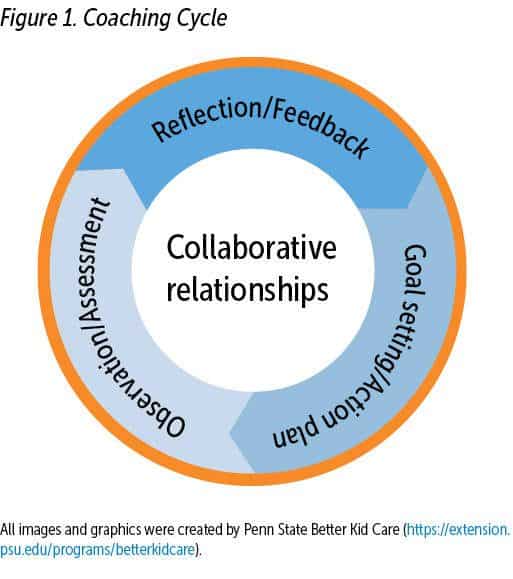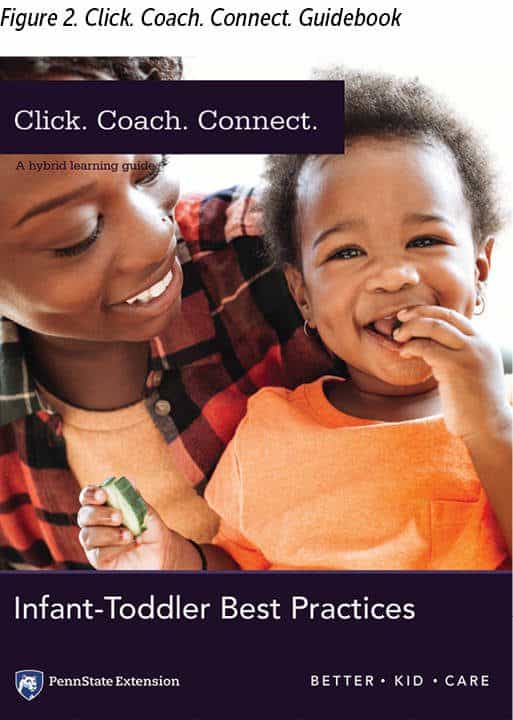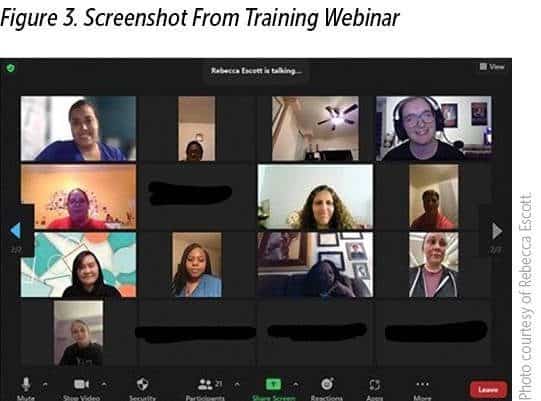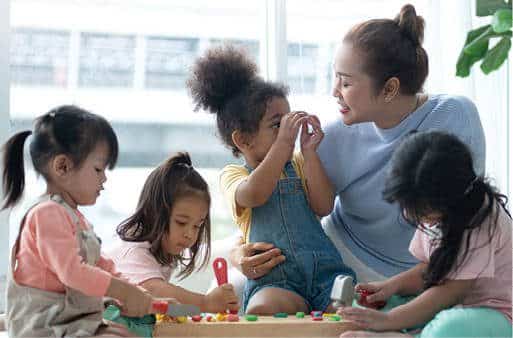Benjamin L. Bayly and Rebecca Escott, Penn State University
Nancy Nicewonger and Caroline Campana, First Up, Philadelphia, Pennsylvania

Abstract
Infant–toddler programs stand to benefit greatly from evidence-informed coaching and professional development opportunities. However, few coaching initiatives have been delivered within infant–toddler programs, and these programs often face challenges that affect their educators’ ability to participate. In an effort to support infant–toddler teachers, the Click. Coach. Connect. coaching project was created. Click. Coach. Connect. empowered infant–toddler program directors, and later lead teachers, to serve as coaches within their programs. Ratings of quality and participant feedback indicated this coaching model can be used successfully to improve the quality of infant–toddler programs.
More than half of infants and toddlers in the United States spend time in at least one regular, nonparental care arrangement (Mamedova & Redford, 2019). The relationships infants and toddlers form with their caregivers are extremely important for their learning and well-being as there is general consensus that the birth-to-3 period represents the highest risk, highest reward period in life (Moreno et al., 2015). It is therefore not surprising that the quality of infant–toddler care plays a vital role in children’s lives, as high-quality care has been shown to support cognitive and social–emotional development both in the short- and long-term, particularly for young children from economically disadvantaged families (Moreno et al., 2015; Vandell et al., 2010). High-quality infant–toddler care is characterized by an environment that is safe, clean, and cognitively stimulating with educators who are warm, sensitive, responsive, and frequently verbally communicate with the children in their care (Mangione et al., 2016). Despite the high number of infants and toddlers who spend at least part of their day in a care setting, as well as what researchers know regarding the importance of these experiences, concerns remain regarding uneven quality of infant–toddler care, with many infant-toddler care settings being considered “low quality” (Paulsell et al., 2013).
Concerns over quality of care due to a lack of investment, resources, and professional development opportunities, as well as an overworked and under-supported workforce, are prevalent throughout the early childhood education (ECE) field (i.e., both infant–toddler and preschool-age programs); however, these concerns are particularly acute in infant–toddler programs (Aikens et al., 2016; Burchinal, 2018; Horm, 2019). Typically, infant–toddler teachers are more stressed, are paid less, are at greater risk to leave the field, and receive fewer professional development opportunities than prekindergarten/preschool teachers, which may explain why infant–toddler programs are often considered to be lower quality than prekindergarten programs (Aikens et al., 2016; Whitebook et al., 2015).
Evidence-Informed Coaching and Professional Development
Coaching and professional development (see Figure 1) have demonstrated promise as mechanisms to support infant– toddler teachers and improve the quality of care provided (Aikens et al., 2016). Coaching is a relationship-based process in which an expert supports another professional in building capacity for specific skills and behaviors, whereas professional development consists of learning activities to help prepare educators to work with young children and their families (National Association for the Education of Young Children, 2011). While both coaching and professional development in isolation have been shown to support ECE educators’ use of appropriate classroom practices, the two delivered in tandem may be particularly effective in improving quality within infant– toddler classrooms (Moreno et al., 2015).

Despite encouraging results from ECE coaching and professional development efforts, these initiatives have rarely been delivered within infant–toddler programs (Moreno et al., 2015). While prekindergarten programs and teachers need both professional development and coaching opportunities, there is reason to believe that infant–toddler teachers stand to benefit even more given that they have been a historically under-resourced and under-supported workforce (Phillips & Lowenstein, 2011).
Unfortunately, implementing coaching and professional development initiatives presents a variety of challenges for interested infant–toddler programs. Infant–toddler programs often struggle to find the funding and time required for teachers to participate (Aikens et al., 2016; Berlin et al., 2020). For many infant–toddler programs, it may simply not be feasible to hire an outside expert to provide coaching support and teachers may not have the time to devote to participating in professional development. Ultimately, while infant–toddler teachers may need coaching and professional development more than anyone else in the ECE field, there are obstacles that make it extremely challenging for these teachers to be reached through coaching and professional development. To overcome these challenges and support multiple cohorts of infant–toddler teachers within Philadelphia, the Click. Coach. Connect. coaching initiative was created by Penn State Better Kid Care, an established organization providing coaching support to ECE professionals and a leader in on-demand professional development, with funding from the William Penn Foundation.
Click. Coach. Connect.
In 2017, the William Penn Foundation awarded funding to Penn State Better Kid Care to develop and evaluate an infant–toddler professional development program to be used by early learning program administrators to coach their teaching staff. The initiative, known as Click. Coach. Connect., was designed to support infant–toddler teachers by pairing online asynchronous professional development courses with evidence-informed coaching.
Click. Coach. Connect. consists of four key components:
1) An in-depth, 344-page, digital coaching guidebook (see Figure 2) with a collection of 222 clickable, digital coaching support resources including handouts, short videos with discussion questions, reflection and action tools, and family engagement resources with information, application activities, and resources promoting enhanced practices across the six domains of the Infants and Toddlers Environment Rating Scale Third Edition (space and furnishing, personal care routines, language and books, activities, interaction, and program structure; ITERS-3, Harms et al., 2017).

2) On-demand professional development relevant for infant and toddler development.
3) Coaching training
4) Ongoing coaching support
Click. Coach. Connect. is unique in that, instead of requiring infant–toddler programs to hire outside coaches, directors received training in the first iteration to serve as coaches, and identified lead teachers were used as coaches in the second iteration. This model of training infant–toddler educators to serve as coaches represents a more sustainable and feasible alternative to past coaching efforts, as educators are able to provide training and support to current and future infant– toddler teachers without being forced to repeatedly hire an outside coach and educators likely feel empowered to be leaders in the profession. In addition, Click. Coach. Connect. provided professional development in the form of online courses with an encompassing guidebook to ensure educators had flexibility in when they pursued professional development opportunities and had just-in-time coaching support.
After a brief pilot of the coaching process and guide, infant– toddler program directors were recruited and trained to be coaches within their own centers. Directors observed and provided feedback, resources, times for discussion, and encouragement to their infant–toddler employees. Prior to the coaching commitment, infant–toddler program staff were invited to complete 10 hours of online infant–toddler courses on topics including cognitive, social–emotional, and physical development; supervision; caregiving routines; and learning through play. Once trained, the directors serving as coaches coached their employees on a weekly basis, collaboratively set action plans, and worked toward improved practices. The coaches received regular phone support from a coach partner from Penn State Better Kid Care, which was also the organization providing the on-demand professional development. These phone calls allowed coaches to debrief and ask questions as they developed their skills and searched for appropriate resources to introduce in coaching conversations.
The success of the first iteration of Click. Coach. Connect. was evaluated using both quantitative and qualitative methods. First, the ITERS-3 (Harms et al., 2017) was used to assess the quality of the infant–toddler classroom both prior to and immediately after the completion of Click. Coach. Connect. The ITERS-3 consists of trained observers rating the quality of the infant–toddler classroom environment across six subscales (space and furnishing, personal care routines, language and books, activities, interaction, and program structure) on a 1–7 point scale. Participating infant–toddler classrooms improved significantly on the ITERS-3 indicator of overall quality as well as on all six individual subscales (see Table 1). In addition to conducting observations of classroom environment quality, qualitative feedback was collected through coaching logs, coaching calls, and a debriefing focus group at the conclusion of the coaching project. This opportunity to provide feedback allowed the project team to collect more in-depth information from the directors and allowed the directors to have their voices heard.
Table 1. Pre and Post Scores on ITERS-3 From the First Iteration of Click. Coach. Connect
All in all, coaches in the first iteration of Click. Coach. Connect. expressed an overwhelmingly positive sentiment toward both the coaching guide and coaching training they received. Coaches frequently spoke to the comprehensive nature of the coaching guide. For example, one coach stated, “Every time I go to the guide with an ‘I hope they have something about….’ I have been able to find something helpful,” while another said, “The guide is really comprehensive, I did not really come across anything in the classroom that was not addressed somehow in the guide.” Another coach reported increases in both their own self-efficacy and the teachers they supported stating, “I believe it was confidence for both myself and my staff. I became more confident in my ability to coach/mentor and my staff gained the confidence to deliver quality care to this age group.” Other coaches spoke to the importance of supporting infant–toddler teachers specifically, for example one mentioned “They (the infant-toddler teachers) also received the resources they so desperately needed. There are limited resources out there in the area of infant/toddler, whereas, there are endless amounts available for preschool.”
In addition to the positives that came from the coaching initiative, the Click. Coach. Connect. team learned of challenges related to delivering coaching support. Multiple coaches reported that staff instability as well as the director’s ability to free up time in classrooms and meet with individual staff were challenging. At times there was also tension reported within the coaching pairs due to the coach serving as the supervisor of the coachee. Infant–toddler teachers also reported not always feeling free to experiment and try new ideas, to admit gaps in understanding, or to speak freely. Ultimately, while the initiative did result in noted gains in quality, as evidenced by significantly higher scores across the ITERS-3 as well as positive feedback from participants, there were improvements to be made as the project team desired to scale the use of the guide, continue to refine the model of in-house coaching, and further empower infant–toddler teachers.
A Second Iteration of Click. Coach. Connect.
In 2021, the William Penn Foundation provided funding to Penn State Better Kid Care to partner with First Up to train infant–toddler teaching staff on the Click. Coach. Connect. professional development program, with the goal of developing peer mentor coaches. First Up is a Philadelphia agency that works in the area of infant–toddler professional development and coaching to maximize expertise, community connections, and financial resources. While this second iteration of Click. Coach. Connect. is currently underway, this expanded partnership has already enhanced the experience for everyone involved. Rather than competing for infant–toddler teachers and duplicating efforts, Penn State Better Kid Care and First Up are coordinating efforts, sharing expertise, and collaborating on recruitment and design decisions.
The second iteration of Click. Coach. Connect. differed from the initial coaching project in several meaningful ways. First, infant–toddler teachers were recruited to serve as both coaches and peer learners (i.e., the coachee). This decision was made to remove the supervisor dynamic in the coaching experience, provide more regular and organic coaching opportunities, and empower infant–toddler teachers. Second, the participation in the coaching project was a collaborative decision made by infant–toddler teachers and their program directors (as opposed to only the program directors). This decision was made to minimize feelings of obligation and promote feelings of autonomy, buy-in, and engagement among the teachers, all of which have been shown to be relevant for the success of coaching and professional development (Aikens et al., 2016). Third, individual teachers were directly compensated as opposed to financial payments being sent to infant–toddler programs. Doing so allowed infant–toddler teachers to receive financial compensation for the time devoted to the project, instead of payments being absorbed into infant–toddler program budgets. Fourth, while all online professional development courses were delivered up-front in the first iteration of Click. Coach. Connect., the professional development courses were spread out over a longer period of time in the second iteration to allow teachers to integrate ideas into practice and ensure that the coaching support aligned closely with the professional development topics. Finally, additional data for potentially relevant outcomes will be collected to ensure a more rigorous evaluation of the program and allow for the assessment of changes in feelings of teachers’ reports of self-efficacy, satisfaction, positive work climate, and knowledge of infant–toddler development and enhanced practices, in addition to the overall quality of the classroom environment.
Currently 18 coach–peer learner pairs are holding biweekly classroom observations and coaching conversations. While the majority of the coaching teams are responding with enthusiasm, some teams who initially enrolled have been unable to continue due to the overwhelming circumstances of the COVID-19 pandemic. From initial qualitative reports, this strategy of empowering infant–toddler teachers to serve as coaches appears to be most effective when there is buy-in from the coach, peer learner, and director. One coach reported,
Unfortunately, due to staffing issues at the center in the past 2 weeks, I was limited in the time I could spend conversing with my peer learner. I was also unable to directly observe my peer learner in her classroom these past 2 weeks. However, the center’s director made an arrangement so that my peer learner and I worked together for a few days during the morning in her classroom with toddlers in the older age range. In the time that we worked with one another, we discussed our individual responses to the “reflect on peer-to-peer interactions and what you do to support infants and toddlers to learn social skills” handout. We used the handout as a blueprint to reflect on areas for successful social skill development of toddlers in our respective classrooms and whether our classrooms encourage or feature those aspects. We also used these topics to look at different ways we can improve upon our classes and brainstormed new ideas to incorporate into our classrooms to better encourage social skill development in toddlers and infants.
It is also clear that while coaching conversations are happening more frequently and often in real time, some coach–peer learner pairs may appreciate a more structured approach to coaching. For example, one coach commented in a coaching log that “Our conversations happen naturally and consist of what it is we are supposed to be doing. We are both a little confused. We talk about helping toddlers manage through their emotions.”
Coaches and peer learners from the second iteration of Click. Coach. Connect. are participating in bimonthly training sessions that focus on both elements of positive coach–peer learner relationships and enhanced practices in infant–toddler classrooms (see Figure 3).

These online learning community gatherings are intended to provide coaches and peer learners with ongoing instruction around enhanced practices in infant–toddler classrooms that aligns with the Click. Coach. Connect. guidebook while building feelings of connection and community among the coach–peer learner teams. Coaches also receive bimonthly check-in calls from a coaching partner. This phone support appears to be making a huge difference in promoting teachers’ engagement and comfort with the process. After a guiding conversation, one coach–peer learner team reported,
So we were talking about possibilities, like how can that upbeat change be replicated on a regular basis? It would seem to help everyone children and teachers alike… We were brainstorming…Really opened up a whole new discussion. A whole new direction. Maybe we don’t have to be overworked, overwhelmed, frazzled teachers knee-deep in voodoo every day. We spoke about other topics… Interesting possibilities await!…I think having these outlets to write and think are valuable for us to unload. I’d like to know more about what the other coaches are writing about and what their challenges and discussions with their peer learners yielded.
This second iteration of Click. Coach. Connect. will continue for 12 months and as such it is difficult to assess the overall impact on teachers’ practices, the classroom environment, and teachers’ feelings of self-efficacy; however, coaches are already self-reporting growth in their own skills and a positive impact in their classrooms. For example, one coach reported that
After the last conversation, I feel as though I am more comfortable and better understanding of the role of a coach. My voice, tone, and the importance of always having “listening eyes” are the keys that I believe make for a successful coach. Every time that I complete the coaching log, the questions give me an opportunity to look at myself. While I fill out the questions, I am better able to see how I have done in the last 2 weeks, make note of what has or has not worked, and figure out what I can do to better improve myself not just as a mentor/coach but also as a teacher.
Lessons Learned
Infant–toddler teachers have long been an under-resourced, under-supported, and under-trained workforce, which has led to infant–toddler care that is often deemed subpar (Paulsell et al., 2013). While professional development and coaching can successfully improve the quality of care children receive, too often these efforts have focused on prekindergarten programs and teachers while neglecting the needs of infant–toddler educators. This lack of support was often communicated in the Click. Coach. Connect. initiatives, with one participant expressing genuine surprise by stating “Wait, you’re going to work with us?” after learning about the resources and support specifically tailored to the needs of infant–toddler teachers.
Infant–toddler teachers clearly need support and stand to benefit from evidence-informed coaching and professional development initiatives, a fact that has only been exacerbated by the COVID-19 pandemic (Lee & Parolin, 2021). However, infant–toddler programs often face barriers to implementing these initiatives, and concerns including a lack of capacity, time, and finances make many coaching projects unsustainable (Aikens et al., 2016). To overcome these barriers and concerns regarding the sustainability of the coaching efforts, we used a different approach where first directors were trained as coaches and then infant–toddler lead teachers were trained as coaches. Program evaluation results from the first iteration of Click. Coach. Connect. indicated that this model can be used successfully to improve the quality of care in infant–toddler classrooms. In addition, while the second iteration of Click. Coach. Connect. is still ongoing, initial feedback suggests that, with support, infant–toddler teachers can successfully serve as coaches for their peers.
The Importance of Collaboration
It is important to acknowledge the challenges the infant– toddler teacher workforce faces. To overcome these challenges and ensure that infant–toddler educators receive the support they need, it is crucial that collaborative relationships between invested partners are leveraged. These coaching initiatives would not have been possible without funding from the William Penn Foundation that was devoted specifically to staff development and compensation for participants. In addition, it is unlikely that these initiatives would have been as effective without a dedicated interest from Penn State Better Kid Care and First Up, two established leaders in the coaching and professional development world.
In both iterations of Click. Coach. Connect infant–toddler coaching and professional development was provided free-of-charge, eliminating a common barrier to participating in similar initiatives (Aikens et al., 2016). In the second iteration of Click. Coach. Connect., First Up, an established ECE organization in Philadelphia, joined the project to recruit infant–toddler teachers, provide coaching support, and support project logistics. Having First Up involved has been integral to the success of Click. Coach. Connect. as they are a well-known and respected agency in Philadelphia and bring a reputation of trust and investment among the infant–toddler workforce. The success of Click. Coach. Connect. demonstrates the utility of two unique, sustainable models for delivering evidence-informed coaching and professional development to a workforce that is in desperate need of support. It is important that we continue to leverage and look for collaborations between invested organizational partners to ensure infant– toddler teachers receive sufficient professional learning and support so that they can provide appropriate care for young children and promote their healthy development.
Author Bios
Benjamin L. Bayly, PhD, is an assistant professor of family studies, child, and youth development at Penn State University, where he serves as the academic lead for Penn State Better Kid Care. His research focuses on risk and protective factors that shape child development as well as educator and structural factors that underlie the effectiveness of early care and education programs.
Rebecca Escott, MEd, is an early childhood education/ out-of-school time (ECE/OST) specialist with Penn State Better Kid Care. She has worked in ECE/OST spaces since 1988. She has served as the project coordinator for several coaching initiatives including Equipping a New Generation of Infant Toddler Leaders. Ms. Escott created the Click. Coach. Connect Infant-Toddler Coaching Guide series and several online coaching courses. She has also authored a wide range of online resources covering infant–toddler development, inquiry in family-based care, and STEM and STEAM learning. She has presented at the National Association for the Education of Young Children, National Association for Family Child Care, National AfterSchool Association, and National Association of Extension 4-H Agents. Ms. Escott serves with colleagues in the Latinx Ag Network (LAN) and other diversity, equity, and inclusion and virtual engagement working groups. She facilitates learning among educators in the field, giving their ideas voice and their brains inspiration. She encourages each ECE/OST educator to become a thinking professional, a citizen scientist as they venture, try new ideas, observe, analyze, and grow.
Nancy Nicewonger, MA, is a professional development instructor for First Up, providing trainings and credit-bearing coursework for educators in Philadelphia and the surrounding counties. Nancy’s passion is working with infant and toddler teachers. After graduating with an education degree from Messiah College, Ms. Nicewonger has worked in the field for more than 30 years, receiving a master’s degree from the University of North Carolina–Greensboro. Over the years, she has worked in four states in both rural and urban areas.
Caroline Campana, MEd, is the director of workforce and professional development for First Up. Her responsibilities include designing and overseeing the workforce development and career pathway work that First Up is providing, managing all professional development opportunities, planning the annual conference, and managing a team of early childhood consultants. Ms. Campana has more than 20 years’ experience working in the early childhood field and holds a bachelor of science in education and a master’s degree in educational leadership. She has extensive experience with Keystone Stars, Best Practice, and National Association for the Education of Young Children accreditation. Ms. Campana is a Pennsylvania Quality Assurance System certified instructor, a certified financial coach, and obtained her Non-Profit Executive Leadership Certification from Bryn Mawr College. In addition to working at First Up, she has taught social and emotional development courses for Penn Literacy Network through the Graduate School of Education at The University of Pennsylvania and is currently an adjunct professor at Delaware County Community College.
Suggested Citation
Bayly, B. L., Escott, R., Nicewonger, N., & Campana, C. (2022). Building collaborative partnerships to support infant–toddler teachers through an evidence-informed coaching initiative. ZERO TO THREE Journal, 42(4), 72–78.
References
Aikens, N., Akers, L., & Atkins-Burnett, S. (2016). Professional development tools to improve the quality of infant and toddler care: A review of the literature. Mathematica Policy Research Reports, (3faeb9b866d946cdaef275044b900ecc).
Berlin, L. J., Shdaimah, C. S., Goodman, A., & Slopen, N. (2020). “I’m literally drowning”: A mixed-methods exploration of infant-toddler child care providers’ wellbeing. Early Education and Development, 31(7), 1071–1088.
Burchinal, M. (2018). Measuring early care and education quality. Child Development Perspectives, 12(1), 3–9.
Harms, T., Cryer, D., Clifford, R. M., & Yazejian, N. (2017). Infant/toddler environment rating scale (ITERS-3). Teachers College Press.
Horm, D. M. (2019). Overview of the Infant-Toddler Workforce White Paper for NIEER. link
Lee, E. K., & Parolin, Z. (2021). The care burden during COVID-19: A national database of child care closures in the United States. Socius, 7. doi:10.1177/23780231211032028. link
Mamedova, S., & Redford, J. (2019). Early childhood program participation, from the National Household Education Surveys Program of 2012: First look. National Center for Education Statistics, Institute of Education Sciences, U.S. Department of Education. link
Mangione, P. L., Kriener-Althen, K., & Marcella, J. (2016). Measuring the multifaceted nature of infant and toddler care quality. Early Education and Development, 27(2), 149–169.
Moreno, A. J., Green, S., & Koehn, J. (2015). The effectiveness of coursework and onsite coaching at improving the quality of care in infant–toddler settings. Early Education and Development, 26(1), 66–88.
National Association for the Education of Young Children (NAEYC). (2011). Early childhood education professional development: Training and technical assistance glossary. link
Paulsell, D., Tout, K., & Maxwell, K. L. (2013). Evaluating implementation of quality rating and improvement systems. In T. Halle, A. Metz, & I. Martinez-Beck (Eds.), Applying implementation science in early childhood programs and systems (pp. 269–293). Brookes.
Phillips, D. A., & Lowenstein, A. E. (2011). Early care, education, and child development. Annual Review of Psychology, 62, 483–500.
Vandell, D. L., Belsky, J., Burchinal, M., Steinberg, L., Vandergrift, N., & NICHD Early Child Care Research Network. (2010). Do effects of early child care extend to age 15 years? Results from the NICHD study of early child care and youth development. Child Development, 81(3), 737–756.
Whitebook, M., Austin, L. J., & Amanta, F. (2015). Addressing infant-toddler teacher compensation. Early Educator Central.




